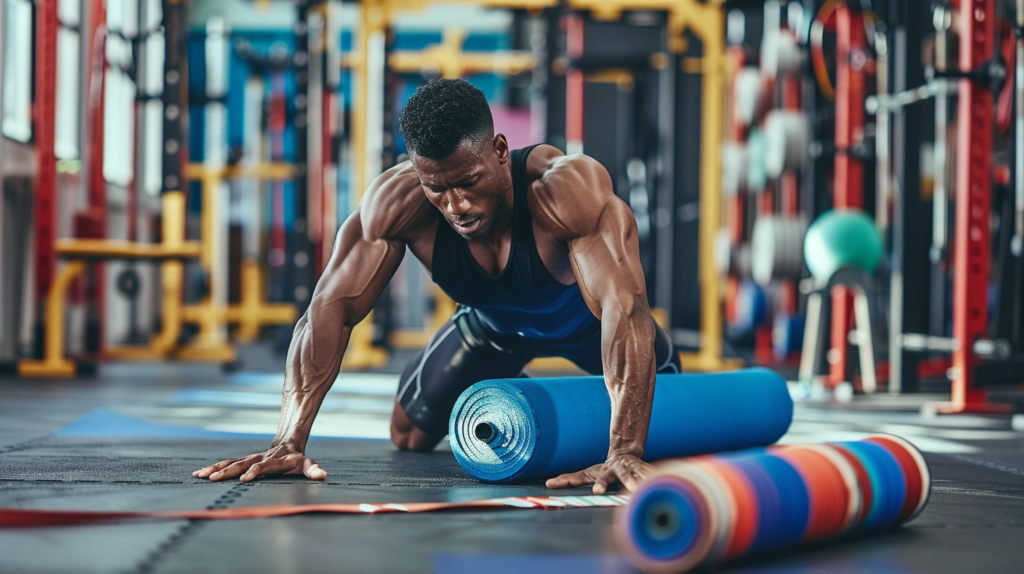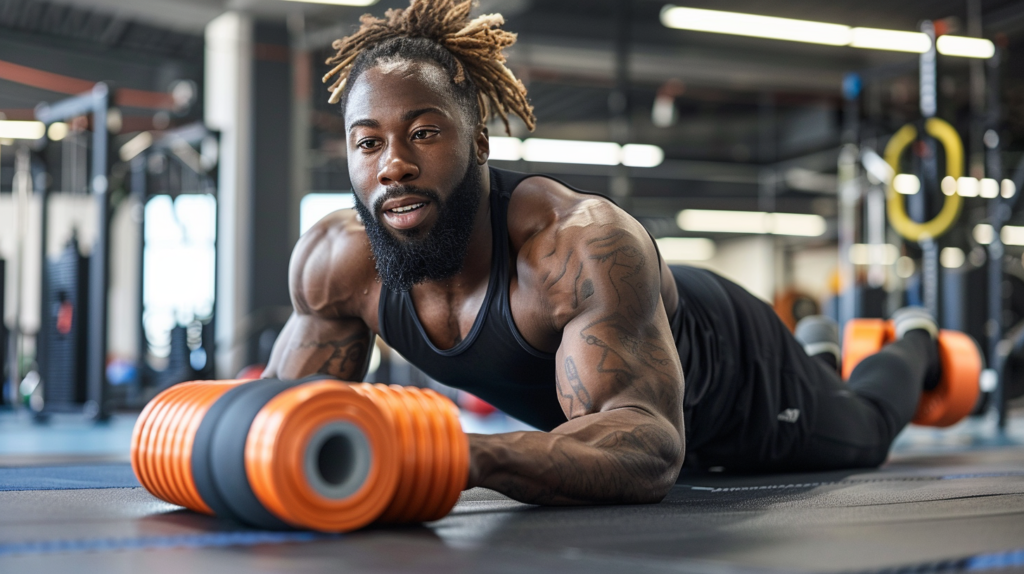Optimize your post-workout recovery with key strategies. Fuel up with a combo of protein and carbs within an hour. Consider whey protein for quick absorption. Hydrate well, balancing electrolytes for muscle function. Rest is crucial; aim for 7-9 hours nightly. Active recovery like foam rolling and stretching improves blood flow and flexibility. Mobility work enhances joint health and movement. These tips are just the beginning of enhancing your bodybuilder recovery routine.
Key Takeaways
- Consume protein and carbs within an hour for optimal recovery.
- Hydrate with electrolytes for muscle function and recovery.
- Prioritize quality sleep (7-9 hours) for muscle repair.
- Incorporate active recovery like foam rolling and stretching.
- Focus on joint mobility exercises for flexibility and injury prevention.
Optimal Nutrition for Recovery

For bodybuilders aiming to optimize their recovery process, ensuring optimal nutrition is paramount. Nutrient timing plays a crucial role in replenishing energy stores and promoting muscle repair post-workout. Consuming a combination of protein and carbohydrates within 30 minutes to an hour after exercise can enhance recovery by jumpstarting muscle protein synthesis and glycogen replenishment.
Protein is essential for muscle repair and growth, making it a cornerstone of post-workout nutrition. Whey protein supplements are popular due to their fast absorption rate, ideal for post-exercise recovery. Carbohydrates, on the other hand, help replenish glycogen stores, providing the necessary energy for future workouts. Fast-digesting carbs like white rice or potatoes are excellent choices to pair with protein post-workout.
Supplements can also aid in recovery by filling nutritional gaps or enhancing performance. Branched-chain amino acids (BCAAs) can support muscle protein synthesis, while creatine monohydrate may improve strength and power output. However, it’s essential to prioritize whole foods in your diet and use supplements as a complement when needed for optimal recovery.
Importance of Hydration

Hydration is a critical factor in optimizing recovery for bodybuilders, playing a key role in various physiological processes essential for muscle repair and performance enhancement. Adequate water intake is vital for maintaining electrolyte balance, which is crucial for muscle function and preventing cramps during intense workouts. Electrolytes such as sodium, potassium, calcium, and magnesium are essential for muscle contractions and nerve impulses, highlighting the significance of hydration beyond just quenching thirst.
| Electrolyte | Function | Food Sources |
| Sodium | Regulates fluid balance, nerve function | Table salt, olives |
| Potassium | Muscle contractions, heart function | Bananas, sweet potatoes |
| Calcium | Bone health, muscle function | Dairy products, leafy greens |
| Magnesium | Energy production, protein synthesis | Nuts, seeds, whole grains |
Maintaining an optimal electrolyte balance through proper hydration supports muscle recovery, enhances performance, and aids in overall well-being. Remember, staying hydrated is not only about drinking water but also ensuring a balance of essential electrolytes to support your body’s needs.
Quality Sleep and Rest

Adequate quality sleep and rest are paramount for bodybuilders aiming to optimize recovery and performance gains. Sleep hygiene plays a crucial role in ensuring that the body gets the rest it needs to repair and grow muscle tissue.
Establishing a bedtime routine and creating a relaxing sleep environment can aid in improving the quality of sleep. It’s recommended to aim for 7-9 hours of uninterrupted sleep each night to support muscle recovery and overall well-being.
In addition to quality sleep, incorporating rest days into your workout routine is essential for allowing the body to recover and adapt to the stress of training. Rest days aren’t a sign of weakness but a strategic component of any successful training program.
During rest days, engaging in relaxation techniques such as meditation, gentle yoga, or massage can further enhance recovery.
Active Recovery Techniques

Incorporating active recovery techniques into our routine is crucial for bodybuilders seeking to enhance muscle recovery and performance. Foam rolling is an effective method to release muscle tightness and improve blood flow, aiding in the removal of lactic acid build-up.
By incorporating stretching techniques, such as dynamic stretching or proprioceptive neuromuscular facilitation (PNF) stretching, bodybuilders can improve flexibility and range of motion, reducing the risk of injuries. Massage therapy can also be beneficial in reducing muscle soreness and enhancing relaxation.
Additionally, cold therapy techniques, like ice baths or cold compress application, can help decrease inflammation and muscle damage post-workout. Alternating between hot and cold treatments, known as contrast therapy, can further promote blood circulation and accelerate the recovery process.
Incorporating Mobility Work

Utilizing mobility work exercises is essential for bodybuilders to enhance joint mobility and flexibility. These exercises involve movements that target specific joints, helping to increase the range of motion and improve overall flexibility.
By incorporating flexibility exercises into your routine, you can enhance joint health, reduce the risk of injuries, and optimize performance.
Joint mobility exercises focus on increasing the fluidity and functionality of the joints, allowing for smoother and more controlled movements during workouts. These exercises can include dynamic stretches, joint rotations, and mobility drills that target areas like the shoulders, hips, and spine.
By regularly performing these exercises, bodybuilders can prevent tightness and stiffness in key areas, promoting better movement patterns and reducing the likelihood of overuse injuries.
Flexibility exercises, such as static stretching and yoga poses, can also play a crucial role in maintaining joint health and improving overall performance. These exercises help lengthen muscles, improve circulation, and enhance joint flexibility, leading to better range of motion and reduced muscle soreness post-workout.
Incorporating a combination of joint mobility and flexibility exercises into your routine can significantly benefit your recovery and long-term athletic development.
Frequently Asked Questions
Can I Consume Alcohol After a Workout?
After a workout, alcohol consumption can hinder post-workout recovery due to its dehydrating effects. It’s essential to prioritize hydration for optimal muscle repair and replenishment. Limit alcohol intake post-workout to support your bodybuilding goals effectively.
How Long Should I Wait to Shower Post-Workout?
After exercise, it’s vital to balance post-exercise hygiene with recovery. Studies suggest waiting 30 minutes post-workout before showering. This optimal recovery time allows the body’s natural cooling mechanisms to help with muscle repair and growth.
Is It Okay to Workout on an Empty Stomach?
Working out on an empty stomach may impact performance due to lower energy levels affecting intensity. Fasting benefits may vary among individuals, so listen to your body. Consider light snacks for sustained energy during workouts.
Can I Take Painkillers for Muscle Soreness?
Yes, taking painkillers for muscle soreness can provide temporary relief, but it’s important to explore alternative remedies like natural supplements and recovery techniques for long-term muscle recovery. Consult a healthcare provider for personalized advice.
Should I Stretch Before or After a Workout?
Stretching before a workout can be likened to priming a powerful engine for optimal performance, enhancing flexibility and reducing injury risk. However, post-workout stretching may pose risks when muscles are fatigued. Timing is crucial for stretching effectiveness.
Conclusion
In conclusion, by prioritizing optimal nutrition, hydration, quality sleep, active recovery techniques, and mobility work, bodybuilders can enhance their recovery post-workout.
Imagine your body as a well-oiled machine, fueling it with the right nutrients, keeping it hydrated, and giving it the rest and care it needs to perform at its best.
Incorporating these recovery tips into your routine will help you reach your fitness goals and maximize your gains.













